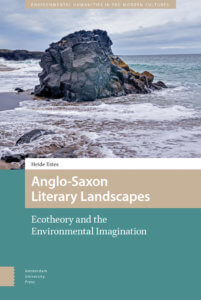
Professor of English literature, Heide Estes, Ph.D., recently published “Anglo-Saxon Literary Landscapes: Ecotheory and the Environmental Imagination.” The book has been hailed as “one of the most important to come out this year” by The Year’s Work in English Studies, a highly regarded review journal published by Oxford University Press.
According to the review, Estes’ book “Is not only one which articulates interesting and important nuances about Old English literature, but it is also an activist-minded piece which raises significant questions about our present anthropocentric lives and the state of the medieval field.”
The Year’s Work in English Studies is a widely used resource in all fields of English literary studies and the “largest and most comprehensive work of its kind,” according to its website. It provides expert, critical commentary of books and journals by experts in each of the fields covered.
As the journal’s co-editor, Dean of the Wayne D. McMurray School of Humanities and Social Sciences Kenneth A. Womack, Ph.D., points out the journal is the “oldest and longest-running periodical of evaluative criticism.” Womack added, “The books and articles that receive high marks in the YWES [The Year’s Work in English Studies] are the blue-chip standards for the field.”
Estes, who joined Monmouth University’s English department in 1998, noted how current real-world problems are found in medieval literature. Estes explained, “The book is about ecocriticism, which is the study of representations of the relationships between humans and the environment, and about how different categories of human influence those relationships, in poetry and prose from early medieval England. It is what scholars call a monograph, a sustained work of critical study about a very narrow topic.”
Estes added that environmental concerns have deep and long roots in our culture. “We can learn from poetry and prose written a thousand years ago in Old English and Latin. Epics like ‘Beowulf’ and shorter poems like the ‘Riddles’ (which influenced Tolkien’s Hobbit) demonstrate that people in early medieval England held a variety of attitudes about the environment. Some poems depict the natural world as a limitless resource for humans to use in wasteful ways. Others demonstrate interest in wilderness and weather without reference to how they impact human lives.”
Estes first became interested in environmental sustainability after her mother loaned her a copy of Frances Moore Lappe’s “Diet for a Small Planet.” After reading it, Estes stopped eating beef and became interested in environmental action and activism. After finding an article in 2005 in the field of environmental literature, Estes began lecturing on the topic and writing about ecocriticism.
Estes also serves as the founding director of Medieval Ecocriticisms, a scholarly group for people interested in environmental interpretations of literature, history, art, architecture, and other disciplines.
Estes’ book can be purchased from any bookseller or directly from the Amsterdam University Press (AUP) website.
